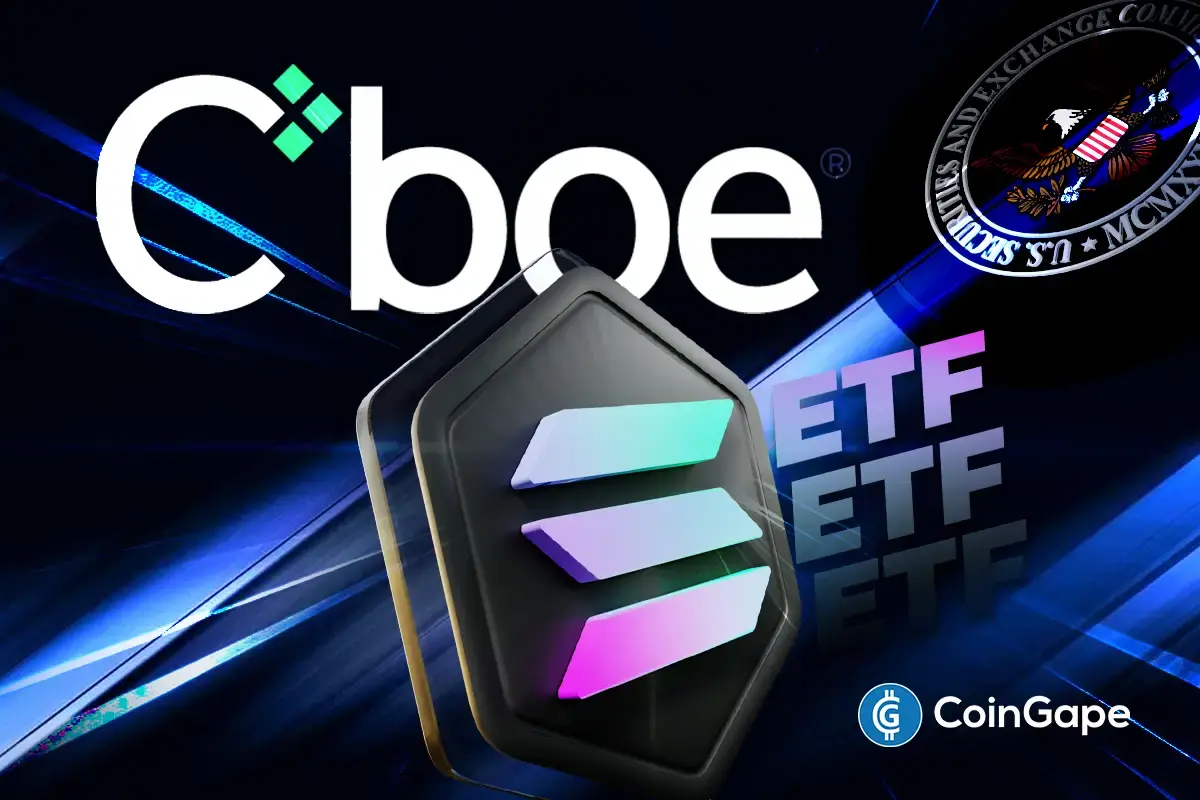Regulation
Treasury and IRS Finalize Broker Rule, Defers DeFi Decision

The US Department of the Treasury and the Internal Revenue Service (IRS) have released new tax guidelines for cryptocurrency brokers, which implements transaction reporting starting from 2025. This new regime, however, has postponed decisions on DeFi activities and unhosted wallet providers, since the IRS is still reviewing the 44,000 comments made by the public.
IRS’s New Reporting Requirements for Brokers
The new IRS rules requires the cryptocurrency brokers such as the trading platforms, hosted wallet services, and the digital asset kiosks to disclose the details of the customers’ asset movements and gains.
These rules, which will take effect from January 1, 2025, seek to integrate crypto brokers with conventional investment firms to file for the 1099 forms and the cost basis data starting from the year 2026.
A saving grace amongst all the crypto regulatory news today : at least we won’t have to write a response to the final rulemaking on the IRS broker rule and non-custodial entities over the 4th of July week: pic.twitter.com/CbLfwIBoGY
— Peter Van Valkenburgh (@valkenburgh) June 28, 2024
Also, the IRS has clarified that the new requirements will also include stablecoin transactions and any high-value non-fungible tokens (NFTs), but ordinary sales of stablecoins below $10,000 and NFT gains below $600 annually do not need to be reported. This regulation is meant to enhance the compliance and decrease the evasion of taxes in the high-risk area of digital assets.
Deferred Decisions on DeFi and Unhosted Wallets
While the new rule provides clear directives for the big centralized exchanges like Coinbase and Kraken, it leaves decisions concerning DeFi activities and unhosted wallets’ providers to a later time.
The IRS added that the non-custodial industry participants would not be barred from being treated as brokers but more analysis is required. The final rules for these entities are expected to be released in the later part of the year.
The IRS highlighted the difficulties of controlling non-custodial companies, noting that such firms may not possess the necessary customer data and transparency frameworks. This decision provides some reprieve to the DeFi sector and unhosted wallet providers as more time is bought in the formulation of better rules.
IRS Requirements for Stablecoins and NFTs
The IRS has explained that most ordinary stablecoin transactions will not need to be reported, with certain exceptions for large transactions and those generating more than $10,000 in annual revenue.
Stablecoin transactions will be recorded in a grouped manner rather than specific transactions to relieve the common cryptocurrency users while at the same time helping the IRS track whales’ activities.
For non-fungible tokens (NFTs) only those taxpayers who have earned $600 or more annually from NFT sales must file and report their total income. The IRS will require the taxpayer identification information, the number of NFTs sold, and the amount of profit made in these reports. The agency will oversee NFT reporting to ensure that it adequately helps in the enforcement of tax laws.
Industry Concerns and Compliance Burden
Introducing these tax regulations has been controversial, with significant pushback from the cryptocurrency industry. Concerns have been raised about the potential overreach of the U.S. government and the burdensome requirements on entities that do not traditionally function as brokers, such as miners and software developers.
The Blockchain Association and the Digital Chamber had flagged the overbreadth of information requested and the substantial compliance burden. They argue that the proposed rule could require the submission of billions of forms, imposing significant costs and time constraints on brokers. The IRS has estimated that the new rule will affect about 15 million people and 5,000 firms.
In response, the IRS stated that it aims to balance the need for comprehensive reporting with the industry’s capacity to comply. The agency also noted that any future changes in legislation regarding stablecoins could lead to adjustments in the tax rules.
Read Also: Digital Chamber Flags Privacy Concerns In IRS Digital Asset Tax Draft
The presented content may include the personal opinion of the author and is subject to market condition. Do your market research before investing in cryptocurrencies. The author or the publication does not hold any responsibility for your personal financial loss.
Regulation
US SEC Acknowledges Fidelity’s Filing for Solana ETF

The U.S. Securities and Exchange Commission (SEC) has formally acknowledged the filing for Fidelity’s spot Solana (SOL) Exchange-Traded Fund (ETF).
This marks a key development in the financial industry, as Fidelity seeks to list its Solana ETF on the Cboe BZX Exchange. The acknowledgment comes after Fidelity submitted a proposed rule change, paving the way for the potential approval of the product.
Fidelity’s Spot Solana ETF Proposal
The SEC’s acknowledgment follows Fidelity’s filing to list and trade shares of the Fidelity Solana Fund under the Cboe BZX Exchange. The proposed rule change, initially submitted on March 25, was later amended on April 1, 2025, to clarify certain points and add additional details.
The amended proposal aims to list the Solana ETF under BZX Rule, which pertains to commodity-based trust shares. According to the Cboe BZX Exchange, Fidelity plans to register the shares with the SEC through a registration statement on Form S-1.
Fidelity’s experience with crypto ETFs, having launched the Fidelity Wise Origin Bitcoin Fund (FBTC) and the Fidelity Ethereum Fund (FETH), has prepared it for this new initiative. FBTC has drawn substantial interest, accumulating nearly $17 billion in assets, while FETH currently manages around $975 million.
This Is A Developing News, Please Check Back For More
Disclaimer: The presented content may include the personal opinion of the author and is subject to market condition. Do your market research before investing in cryptocurrencies. The author or the publication does not hold any responsibility for your personal financial loss.
Regulation
US Senate Banking Committee Approves Paul Atkins Nomination For SEC Chair Role

The U.S. Senate Banking Committee has voted to approve Paul Atkins’ nomination for the role of Chair of the Securities and Exchange Commission (SEC). The vote, which took place on Thursday, passed with a narrow margin of 13-11, along party lines.
Paul Atkins, nominated by President Donald Trump, now moves one step closer to taking over the top regulatory position at the US SEC.
Senate Banking Committee Approves Paul Atkins Nomination
Paul Atkins’ nomination for SEC Chair has received approval despite sharp opposition from Democratic members of the Senate Banking Committee. The vote was entirely split, with Republicans supporting Atkins and all Democrats opposing the decision.
This partisan divide highlights the contentious nature of Atkins’ confirmation, which had been under scrutiny for several reasons.
The committee’s approval now clears the path for Atkins to proceed to the full Senate for a final confirmation vote. Given the Republican-controlled Senate, it is widely expected that Atkins will secure the necessary votes to take over the SEC leadership. With Republicans holding a 53-47 majority in the Senate, the confirmation process is anticipated to move forward swiftly.
This Is A Developing News, Please Check Back For More
Disclaimer: The presented content may include the personal opinion of the author and is subject to market condition. Do your market research before investing in cryptocurrencies. The author or the publication does not hold any responsibility for your personal financial loss.
Regulation
Kraken Obtains Restricted Dealer Registration in Canada

Cryptocurrency exchange Kraken has obtained a Restricted Dealer registration in Canada. The registration comes after completing a pre-registration undertaking (PRU) process with Canadian authorities.
The exchange has also announced the appointment of Cynthia Del Pozo as its new General Manager for North America. Del Pozo will oversee Kraken’s growth initiatives in Canada.
Kraken Completes PRU Process In Canada
Kraken’s Restricted Dealer registration marks the completion of a thorough pre-registration undertaking (PRU) process with Canadian regulators. The registration places Kraken under the supervision of the Ontario Securities Commission (OSC). This oversight ensures users have access to secure crypto products within a properly regulated local ecosystem.
According to the Canadian Securities Administrators (CSA), the Restricted Dealer registration is one of eight firm registration types in Canada. This particular classification is used for firms that “do not quite fit under any other category.” It also comes with specific requirements and conditions set by securities regulators.
Kraken’s regulatory achievement comes during a period of change in the Canadian crypto sector. Just months earlier, competitor Gemini exchange announced its departure from the Canadian exchange market by the end of 2024. This was a move that surprised many and raised questions about cryptocurrency regulation clarity in the country.
Kraken Introduces New Canadian GM
Del Pozo has joined Kraken to lead its Canadian operations as the new General Manager for North America. She has nearly 15 years of experience in corporate development, operations, and fintech consulting. Del Pozo will help to guide Kraken’s expansion across Canada during this important phase of crypto’s development in the region.
“Canada is at a turning point for crypto adoption, with a growing number of investors and institutions recognizing digital assets as a vital part of the financial future. I’m thrilled to join Kraken’s mission at this critical moment, and to lead our expansion efforts, ensuring we continue to serve our clients long-term with innovative and compliant products,” said Del Pozo.
In her role, Del Pozo will focus on strengthening Kraken’s regulatory relationships and also scaling the company’s presence throughout North America.
Del Pozo also commented on the registration achievement: “This Restricted Dealer registration is testament to the high bar Kraken has always set for consumer protection, client service, and robust security. We’re excited to continue expanding our world-class investment platform and to deliver innovative products that provide real-world utility to Canadians.”
The Exchange’s Continued Growth In Canada
Over the past two years, the cryptocurrency exchange has shown steady expansion in Canada while working through the PRU process with regulators. During this period, the exchange has doubled its team size and monthly active users.
According to the official blog post figures, the firm now has more than $2 billion CAD in total client assets under custody. Kraken has also increased support for some of the most popular cryptocurrencies. It provides several CAD spot trading pairs that enable Canadians to trade crypto without paying expensive foreign exchange fees.
According to Innovative Research Group’s 2024 Investor Survey, 30% of Canadian investors currently own or have owned cryptocurrencies. Likewise, a KPMG Canada survey discovered that 30% of Canadian institutional investors now have exposure to cryptocurrencies, which means widespread adoption across investor types.
Disclaimer: The presented content may include the personal opinion of the author and is subject to market condition. Do your market research before investing in cryptocurrencies. The author or the publication does not hold any responsibility for your personal financial loss.
-

 Market20 hours ago
Market20 hours agoBitcoin’s Future After Trump Tariffs
-

 Market24 hours ago
Market24 hours agoIP Token Price Surges, but Weak Demand Hints at Reversal
-

 Ethereum23 hours ago
Ethereum23 hours agoEthereum Trading In ‘No Man’s Land’, Breakout A ‘Matter Of Time’?
-

 Market21 hours ago
Market21 hours agoEDGE Goes Live, RSR Added to Roadmap
-

 Regulation19 hours ago
Regulation19 hours agoUS Senate Banking Committee Approves Paul Atkins Nomination For SEC Chair Role
-

 Altcoin24 hours ago
Altcoin24 hours agoMovimiento millonario de Solana, SOLX es la mejor opción
-

 Bitcoin23 hours ago
Bitcoin23 hours agoBlackRock Approved by FCA to Operate as UK Crypto Asset Firm
-

 Market23 hours ago
Market23 hours agoHBAR Foundation Eyes TikTok, Price Rally To $0.20 Possible

























✓ Share: